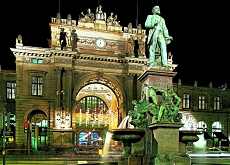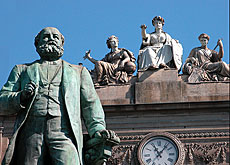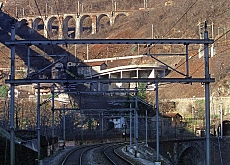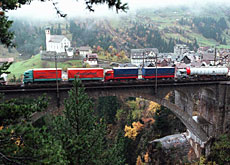Unofficial founding father gets overdue credit

An author tells swissinfo why the man who did more than any other to define the modern state of Switzerland has never been given his proper due.
Historian Joseph Jung has just published a four-volume study on Alfred Escher, to mark this year’s 150th jubilee celebrations of the Credit Suisse Group, the bank the industrialist founded.
Despite his major contributions to politics, railways, universities, major banks and insurance, Escher has been treated “very shabbily” in academic circles, according to Jung.
Jung is managing director of Foundations and Corporate History at CS and his study entitled, Alfred Escher-The Birth of Modern Switzerland, is a fitting tribute to the 19th century mover and shaker.
swissinfo: Your book is more than 1,000 pages long. Has this been a labour of love?
Joseph Jung: Few Swiss personalities of the 19th century have left as many historical sources as Escher. There are more than 4,000 letters, hundreds of speeches and thousands of pages of minutes.
I have been working on Alfred Escher on and off for 20 years. His commitment to Switzerland, his enormous capacity for work, and also the tragic fate of his family have always impressed me. Without wanting to gloss over the darker sides of such a personality, Switzerland was extremely fortunate to have somebody like Escher. Without Escher, there would have been no modern Switzerland. The country would have remained a nation of farmers.
swissinfo: How did he come to have his finger in so many pies?
J.J.: Escher’s unparalleled ascent in the world of politics and business, the accumulation and interweaving of his powerful economic roles and his political offices, and not least the patrician bearing with which he dominated every discussion, marked him out as one of the upper classes.
And he entered the stage of Swiss public life during the final and perhaps greatest years of the Swiss ‘haute bourgeoisie’. This was a time when lines were clearly drawn in parliament. Government was not based on consensus. Referenda, people’s initiatives and the other citizens’ rights that characterize Switzerland today were still a long way off.
swissinfo: What do you think were the man’s greatest achievements?
J.J.: Escher’s name is associated with the creation of a series of business and cultural institutions, illustrating the extraordinary role he played in post-1848 Swiss history: Nordostbahn Railway (founded 1853), Gotthardbahn Railway (1872), Eidgenössisches Polytechnikum (1854, now the ETH Zurich), Credit Suisse (1856), Swiss Life (1857).
Added to these are the business and industrial initiatives that Escher’s Credit Suisse helped to finance and that in some cases also became major companies. These include the insurers Helvetia (1861), Swiss Re (1863), Schweiz (1869) and Zurich (1872). Thanks to Escher, Switzerland, which had been lagging behind the rest of Western Europe in terms of infrastructure, was quickly able to catch up with its neighbors.
swissinfo: Escher was a railway baron, a banker and a politician. He must have had tremendous drive. What spurred him on?
J.J.: Escher came from what was an important Zurich family that had supplied numerous important political figures. But his grandfather Hans Caspar Escher had been involved in old Zurich’s biggest financial scandal, following which he moved abroad.
His father Heinrich, who made a new fortune in the United States, also went against Zurich society’s code of conduct by not repaying his debts. The Eschers, regarded by the old conservative patricians as outsiders, were isolated.
The desire to prove himself to Zurich society was certainly one of the reasons for Alfred Escher’s incredible work rate. However his tireless endeavor was not directed towards personal financial advantage, but towards the common good. Escher’s concern was always for the welfare of canton Zurich and of Switzerland as a whole.
swissinfo: To what extent is it true that from the mid-19th century there was no longer a place for him in Swiss democracy?
J.J.: When in 1868 the people of Zurich voted by an overwhelming majority in favor of a Democrat-sponsored initiative to change the constitution, Escher’s Liberal Party lost its majority in the cantonal legislative and executive. Under pressure from a dissatisfied populace, who were suffering as a result of unemployment, inflation and a cholera epidemic (1867), the Liberals’ power in Canton Zurich was reduced.
But the collapse of his political system in Zurich opened up new opportunities for Escher, and he stepped up his business activities. Escher compensated for political defeat in Zurich with a project that would add a brilliant gloss to an already impressive life’s work: the construction of the Gotthard Tunnel. The historical significance of this epoch-making feat can be compared with that of the Suez Canal.
swissinfo: What exactly caused his death – sheer overwork?
J.J.: Escher worked day and night until he was exhausted and he hardly ever took a holiday. This is certainly one of the reasons why he often fell ill, twice to the point of endangering his life.
After the early death of his wife, he devoted himself entirely to work, without any regard to his health. Dutifulness and an unshakeable will drove him to fulfill his political and business roles even in the last two years of his life.
swissinfo: Was there anyone like him before in Swiss history, or has there been anyone since?
J.J.: The years between 1848 and the 1860s were the only period in Swiss history which can truly be described as economically liberal. A figure like Escher was able to operate without constraint. There was little opportunity to object and Escher was able to push his projects through – to the good of canton Zurich and of Switzerland. He didn’t have to worry about regional policy or any of the other constraints businesses face today.
The concentration of power amassed by Alfred Escher would simply not be possible today. It would be prevented – and rightly so – by the machinery of today’s direct democracy.
swissinfo-interview: Robert Brookes
From 1844 until his death in 1882, Escher sat in Zurich’s Cantonal Parliament and was its president six times. From 1848–1855 he sat on Zurich’s City Council, for four years as its president.
The story is similar on the national level: Escher sat in Switzerland’s House of Representatives for 34 years and was elected its president for four of these (1849, 1855, 1856 and 1862).
Between 1856 and 1877 and then again between 1880 and 1882 Escher was chairman of the board of directors of Credit Suisse. For most of the years between 1853 and 1882 he was either managing director, chairman of the board or both of the Nordostbahn Railway and the Gotthardbahn Railway.
During a decisive phase of the young federal state’s development Escher pushed through projects that put Switzerland on the road to modernisation and established Zurich as its business capital.
This was made possible by the “Escher System” – a concentration of business and political power unimaginable today.

In compliance with the JTI standards
More: SWI swissinfo.ch certified by the Journalism Trust Initiative



You can find an overview of ongoing debates with our journalists here. Please join us!
If you want to start a conversation about a topic raised in this article or want to report factual errors, email us at english@swissinfo.ch.